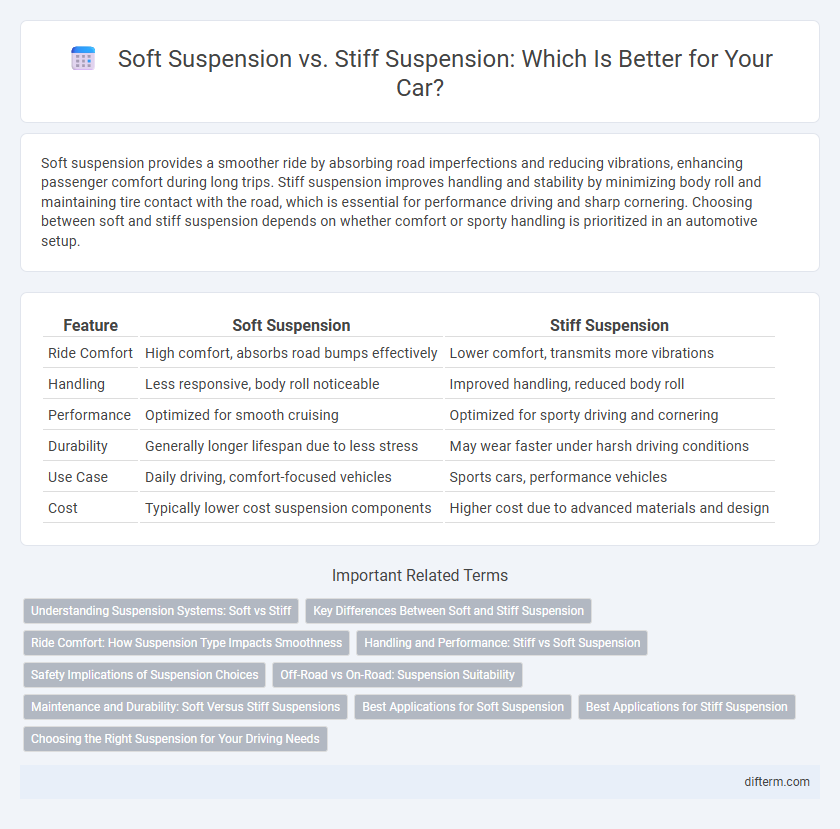Soft suspension provides a smoother ride by absorbing road imperfections and reducing vibrations, enhancing passenger comfort during long trips. Stiff suspension improves handling and stability by minimizing body roll and maintaining tire contact with the road, which is essential for performance driving and sharp cornering. Choosing between soft and stiff suspension depends on whether comfort or sporty handling is prioritized in an automotive setup.
Table of Comparison
| Feature | Soft Suspension | Stiff Suspension |
|---|---|---|
| Ride Comfort | High comfort, absorbs road bumps effectively | Lower comfort, transmits more vibrations |
| Handling | Less responsive, body roll noticeable | Improved handling, reduced body roll |
| Performance | Optimized for smooth cruising | Optimized for sporty driving and cornering |
| Durability | Generally longer lifespan due to less stress | May wear faster under harsh driving conditions |
| Use Case | Daily driving, comfort-focused vehicles | Sports cars, performance vehicles |
| Cost | Typically lower cost suspension components | Higher cost due to advanced materials and design |
Understanding Suspension Systems: Soft vs Stiff
Soft suspension systems provide enhanced ride comfort by absorbing road imperfections and reducing vibrations, ideal for daily driving and uneven surfaces. Stiff suspension setups improve handling and stability by minimizing body roll and maintaining tire contact during high-speed cornering, preferred in performance and sports cars. Choosing between soft and stiff suspension depends on balancing comfort needs with driving dynamics and road conditions.
Key Differences Between Soft and Stiff Suspension
Soft suspension provides enhanced ride comfort and better absorption of road imperfections, making it ideal for luxury vehicles and smooth highways. Stiff suspension offers superior handling and stability during aggressive driving or on rough terrain, commonly used in sports cars and off-road vehicles. Key differences lie in the damping rates, spring stiffness, and overall vehicle dynamics, impacting comfort versus control trade-offs.
Ride Comfort: How Suspension Type Impacts Smoothness
Soft suspension systems absorb road irregularities more effectively, providing enhanced ride comfort and smoother handling on uneven surfaces. Stiff suspension improves vehicle stability and responsiveness but transmits more road vibrations to the cabin, reducing overall smoothness. Choosing between soft and stiff suspension depends on balancing comfort preferences with driving dynamics requirements.
Handling and Performance: Stiff vs Soft Suspension
Stiff suspension enhances handling by reducing body roll and improving cornering precision, making it ideal for high-performance and sporty vehicles. Soft suspension provides better ride comfort by absorbing road imperfections, but at the cost of compromised handling and less stability during aggressive maneuvers. The choice between stiff and soft suspension directly impacts vehicle dynamics, with stiff setups favoring performance and soft setups prioritizing comfort.
Safety Implications of Suspension Choices
Soft suspension improves tire contact on uneven surfaces, enhancing traction and reducing the risk of skidding during sudden maneuvers. Stiff suspension provides better vehicle stability and reduced body roll at high speeds, which is critical for maintaining control during sharp turns or emergency lane changes. Selecting the appropriate suspension stiffness directly affects braking performance and occupant safety by balancing ride comfort with responsive handling.
Off-Road vs On-Road: Suspension Suitability
Soft suspension enhances off-road performance by providing greater wheel articulation and improved shock absorption over uneven terrain, resulting in increased traction and comfort. Stiff suspension is ideal for on-road driving as it offers better handling, reduced body roll, and enhanced stability during high-speed maneuvers. Selecting the appropriate suspension depends on vehicle use, with soft setups favored for rugged off-road conditions and stiff setups preferred for precise on-road control.
Maintenance and Durability: Soft Versus Stiff Suspensions
Soft suspension systems typically require more frequent maintenance due to increased component wear caused by greater movement and flexing under load, potentially reducing durability over time. Stiff suspensions experience less deflection and stress on parts, leading to longer-lasting components and fewer maintenance intervals. Choosing between soft and stiff suspensions impacts overall vehicle upkeep costs and longevity, with stiffer setups generally offering enhanced durability in demanding conditions.
Best Applications for Soft Suspension
Soft suspension systems excel in providing superior ride comfort by effectively absorbing road imperfections and reducing vibrations, making them ideal for luxury sedans and city cars. They enhance handling on uneven urban surfaces and gravel roads by maintaining consistent tire contact, improving safety and passenger comfort. Ideal for daily commuting and long-distance highway driving, soft suspensions balance smoothness with adequate control without compromising stability.
Best Applications for Stiff Suspension
Stiff suspension systems provide enhanced handling and stability by minimizing body roll and maintaining tire contact during aggressive cornering, making them ideal for performance vehicles and track driving. They improve responsiveness and precision in steering, crucial for sports cars and rally vehicles that demand high-speed maneuverability. Furthermore, stiff suspension is preferred in applications where consistent road feedback and control are critical, such as racing and high-performance driving on smooth surfaces.
Choosing the Right Suspension for Your Driving Needs
Soft suspension enhances ride comfort by absorbing road irregularities and reducing vibrations, ideal for daily commuting and long-distance cruising. Stiff suspension provides better handling and stability during high-speed cornering and spirited driving, preferred by performance enthusiasts and track drivers. Selecting the right suspension depends on your driving style, terrain, and vehicle use, balancing comfort with control for optimal performance.
Soft suspension vs Stiff suspension Infographic

 difterm.com
difterm.com